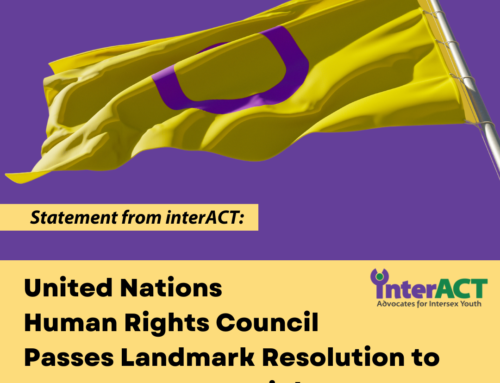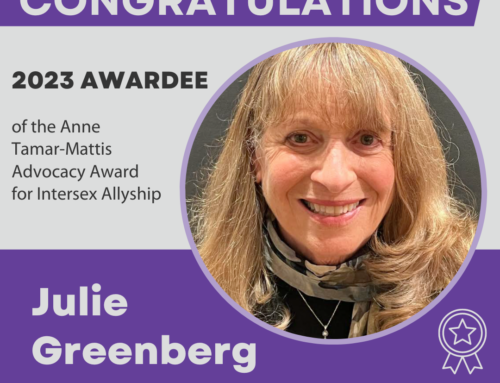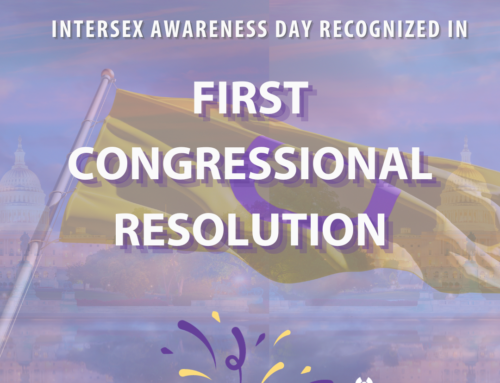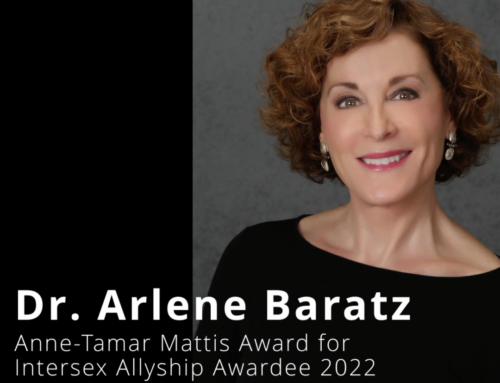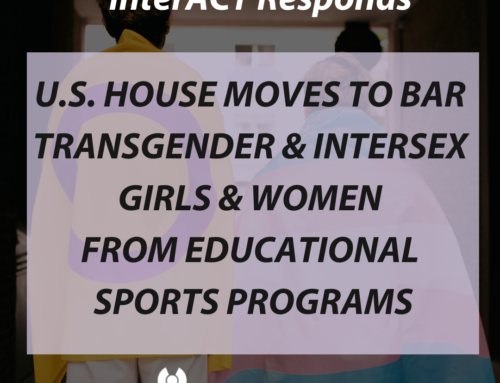The Ides of March (March 15th) marks a day of ancient betrayal, the assassination of Cesar, in the popular imagination of the West. Intersex youth, adults, and their communities are no strangers to such feelings. For the thousands of intersex children and adult survivors who have endured non-consensual genital surgeries, the medical institutions set-up to provide healthcare and healing instead frequently perpetuate grave harm, secrecy and stigma.
However, this March 15th, marked a historic opportunity for Intersex people and their allies to tell their own stories and self-advocate on an international scale. On this day, Jen ‘Pidgeon’ Pagonis, AIC’s Youth Leadership Intern, and a leader in Inter/ Act and the US Intersex rights youth movement provided testimony to the Inter-American Commission on Human Rights. The aim of this hearing was to begin a process in which the body would consider best practices for the treatment of intersex infants and children and determine if current practices, including involuntary sterilization and other forms of non-consensual genital surgeries constitute torture.
The Inter-American Commission’s hearing comes on the heels of the March 4th statement made by the United Nation’s Special Rapporteur on Torture to that body’s 22nd General Council. The statement, consistent with the decades long outcry of intersex people and their families, affirms that these procedures are clearly acts of torture.
Reflecting on her experience in providing her testimony, Pidgeon commented that she was more nervous than she had anticipated. This predicament surely was not helped by the fact that she had been up since 3 am, got pulled over by a traffic cop on the way to the airport and nearly missed her plane! Oh yes, and have I mentioned it was also her birthday?
Yet, she prevailed and her testimony had a powerful impact on the Commissioners, who thanked her for her comments and conveyed how profoundly affected they were by them. During her allotted time, Pidgeon over-viewed her medical experiences, the numerous surgeries she endured during her childhood and young adulthood. Through telling her story with frankness and candor, Pidgeon laid bare the reality for many intersex people like herself in the Americas and globally.
Along with her own story, Pagonis told the story of her peer and fellow Inter/ Act (link) member, Shana. This account further illustrated the impact of shame, stigma, and isolation on intersex people. Pidgeon also conveyed the unforgettable image of her recurrent nightmare: waking up upon a stretcher being wheeled from the surgery suite through a long hospital hallway with bright unforgiving lights blaring above her head and blood-soaked gauze between her thighs. Pidgeon left the commission with a clear message: “Intersex people deserve the right to the pursuit of life, love and happiness within our original, beautiful bodies.”
Mauro Cabral of the Global Action Trans Equality (GATE) Natasha Jimenez of Mulabi, and Paula Sandrine Machado, Phd, a Brazilian social anthropologist and intersex rights advocate also presented testimony. In consensus with Pidgeon and the majority of intersex people, at the hearing these presenters strongly decried non-consensual medical intervention of intersex people as mutilation. In response to the Commissioners’ inquiries regarding best practices, these presenters repeatedly stressed that there is currently no country or locality towards which to look which exemplify best practices; they simply do not yet exist.
To bridge this crucial gap, Pidgeon believes that, “change needs to come from the bottom,” from intersex people themselves. “There needs to be a critical mass of supporters and, ‘intersex’ needs to become a household word.”
Pagonis remains skeptical as to whether the recent increase of international exposure of intersex rights issues will significantly alter the practices in doctor’s offices and surgery rooms around the world, although she hopes the Inter-American Commission will follow the UN’s recent example and issue a statement condemning much of current medical practice for intersex people as torture. Pidgeon remains cautiously optimistic that if there is an newly emerging international consensus it may increase individual power for intersex people dealing with medical institutions. For now, it’s too soon to call, “Ask me again in six months or a year.”
On her last day in DC, Pidgeon visited the Smithsonian Museum. During her visit she received a stark reminder of the necessity of her testimony and for a mass movement to win the civil and human rights of intersex people. As Pidgeon entered an exhibit called The Origins of Life, she approached a series of artistic renderings of early humans. Looking at the images she encountered two young men who were gawking and laughing at them. One exclaimed, “Dude, I had one of those in my clinic this semester.” Pidgeon then realized the two men were medical students and that they were clearly discussing a patient with Turner’s Syndrome, an intersex condition which causes marked physical traits.
It was an overwhelming experience which highlighted the realities of being an intersex person, “ At one minute you could be speaking to an International body and then you can be silenced by ignorance and violence on the part of people who will soon hold a lot of power
Pidgeon, along with a growing movement of intersex youth, is doing this work so future generations of intersex people will have better stories to tell, ones of celebration rather than torture and betrayal . Now that’s a good birthday gift!
For more of Pidgeon’s thoughts and writings, visit Inter/Act’s blog. View the full IACHR hearing here.

